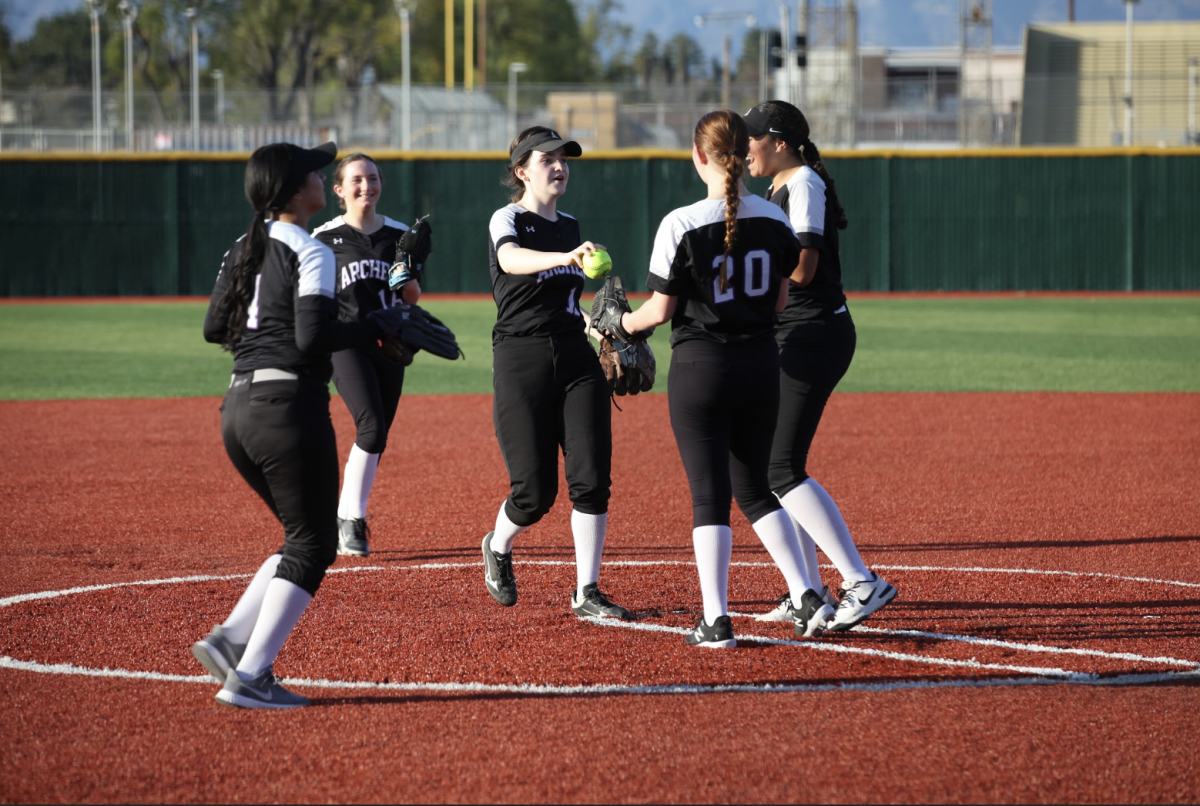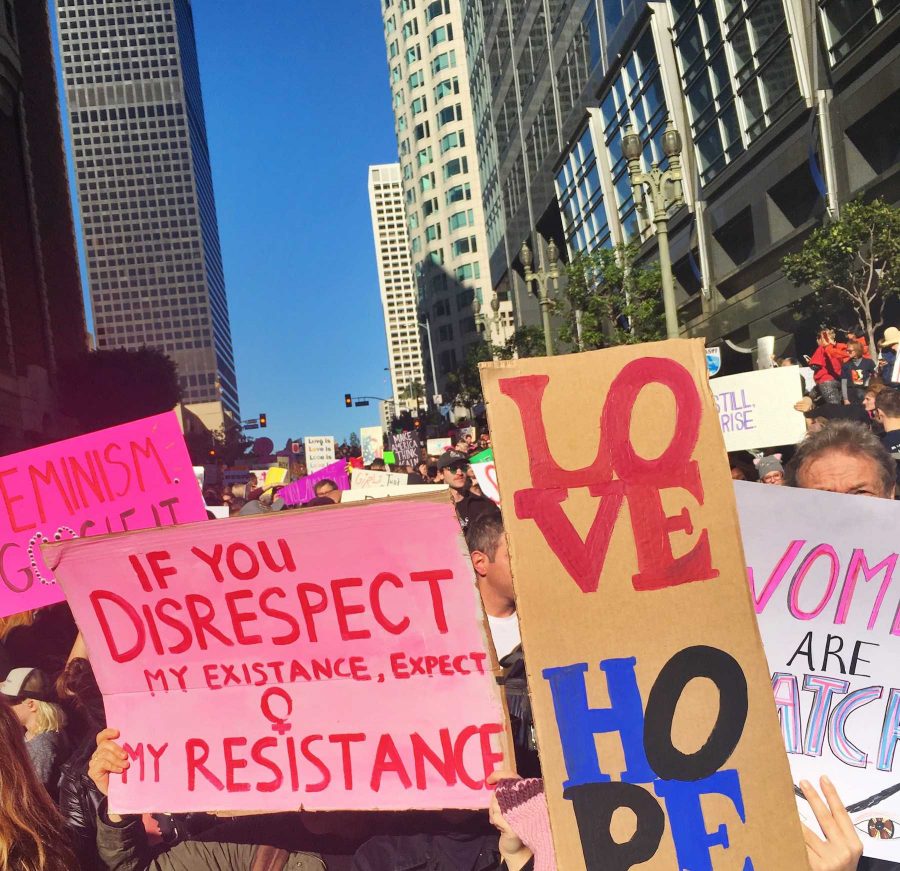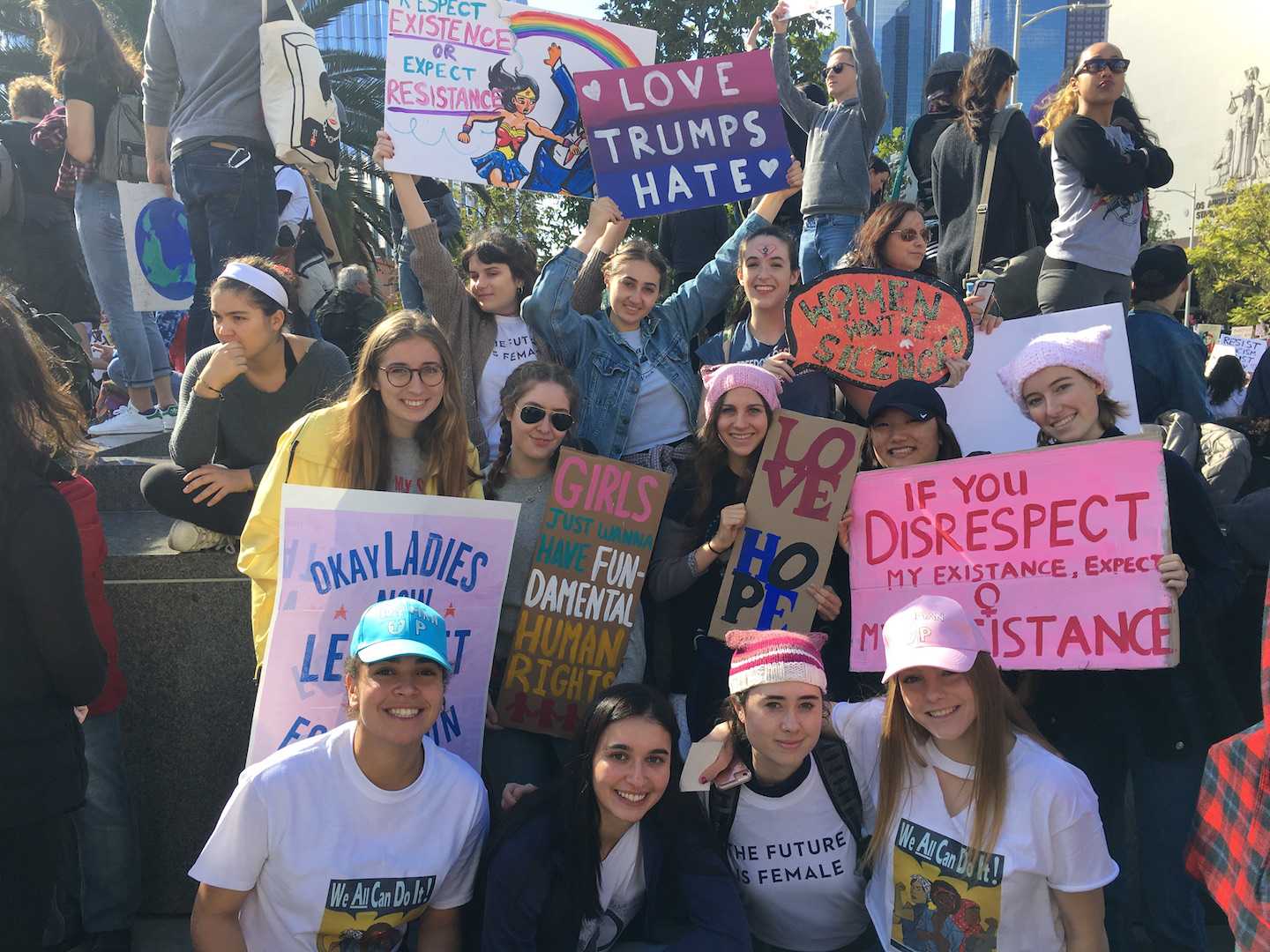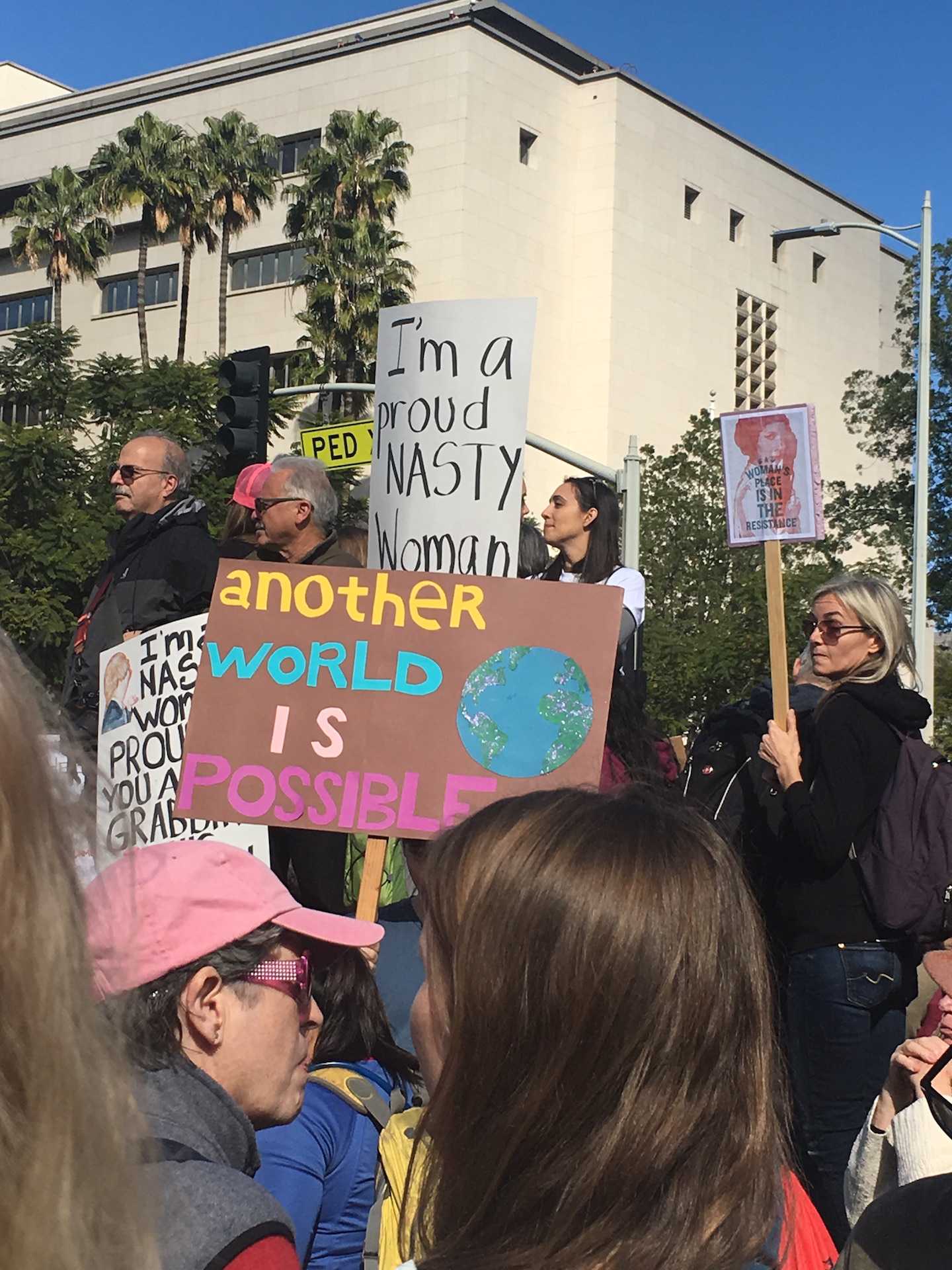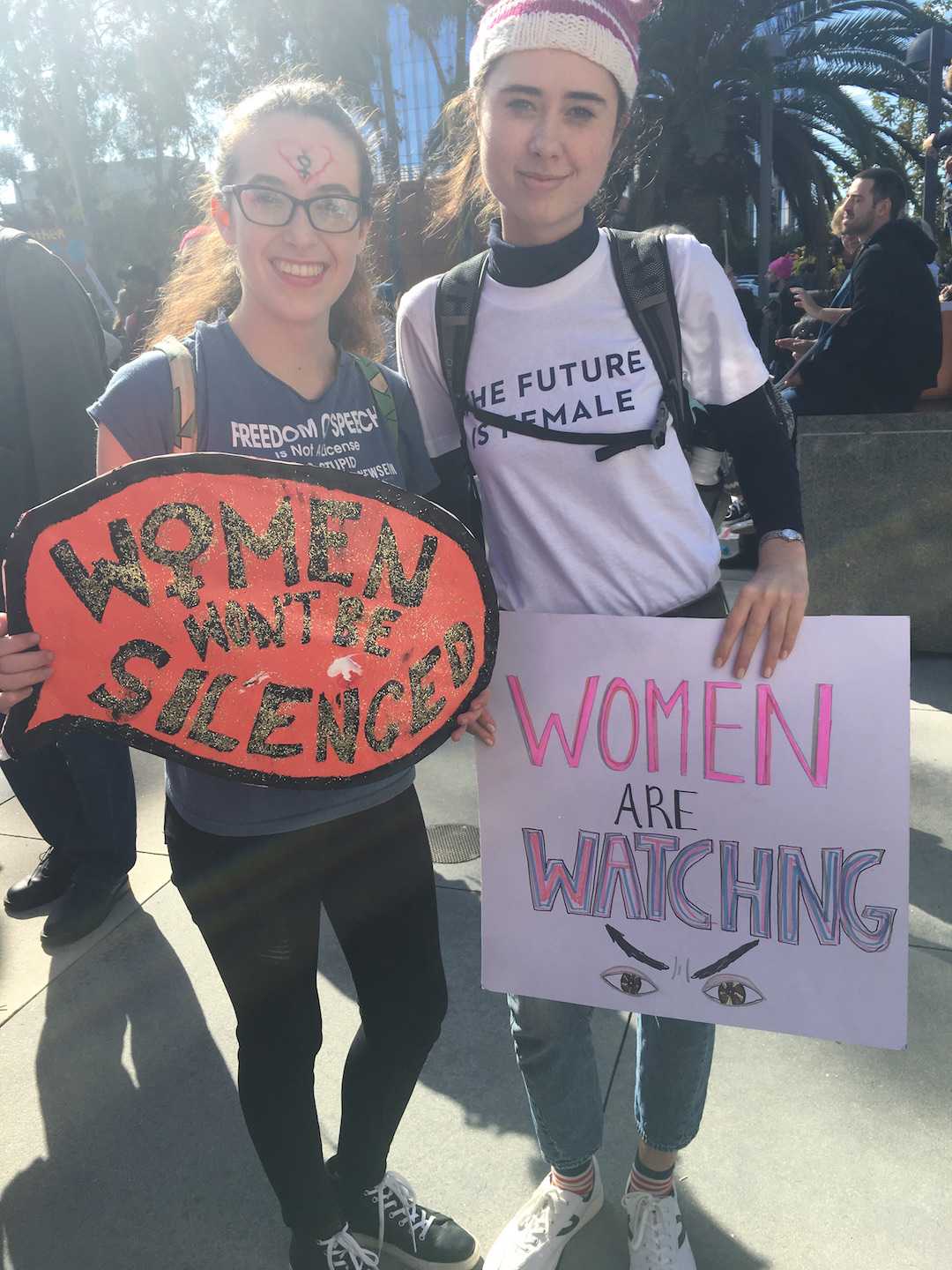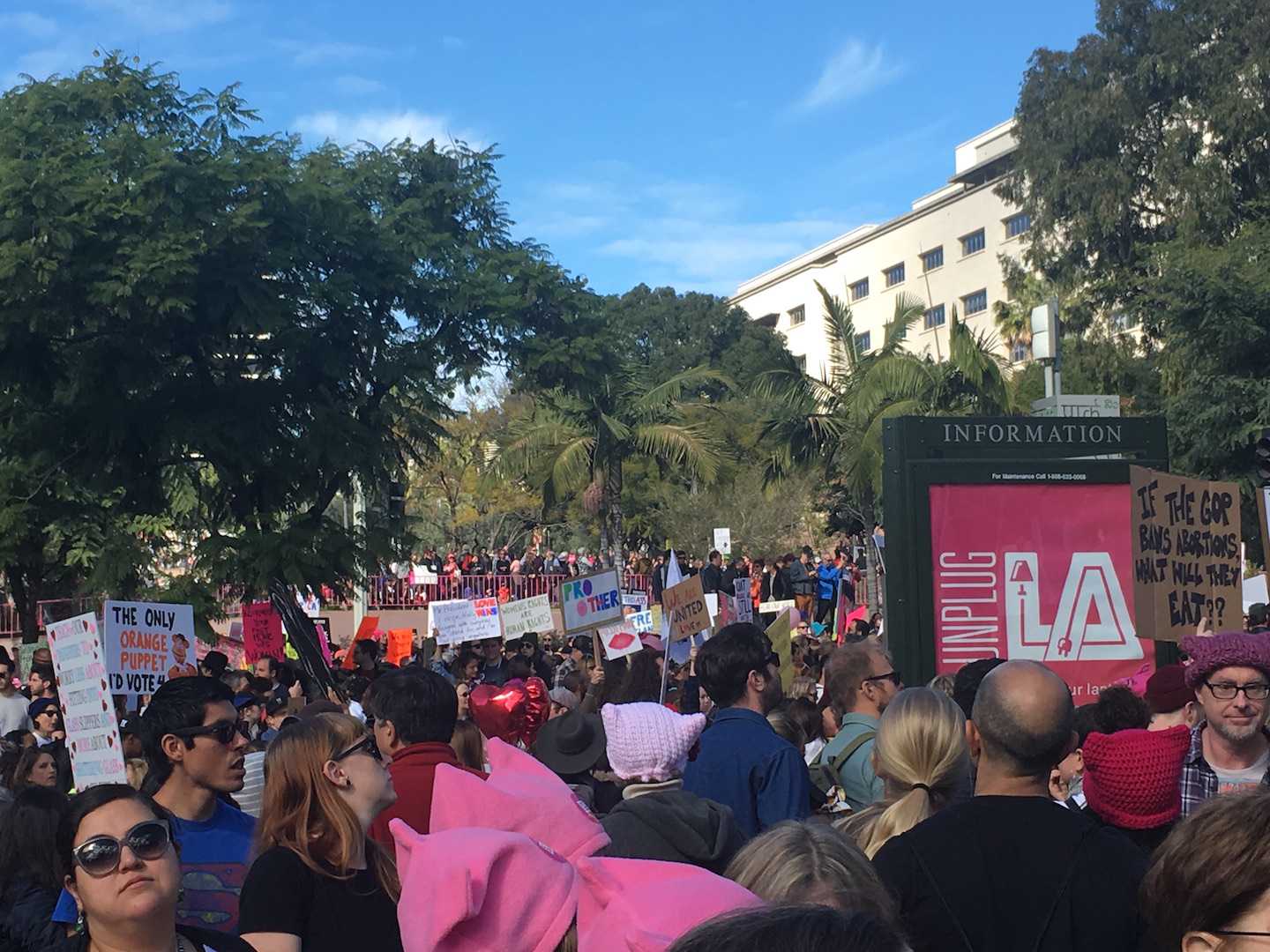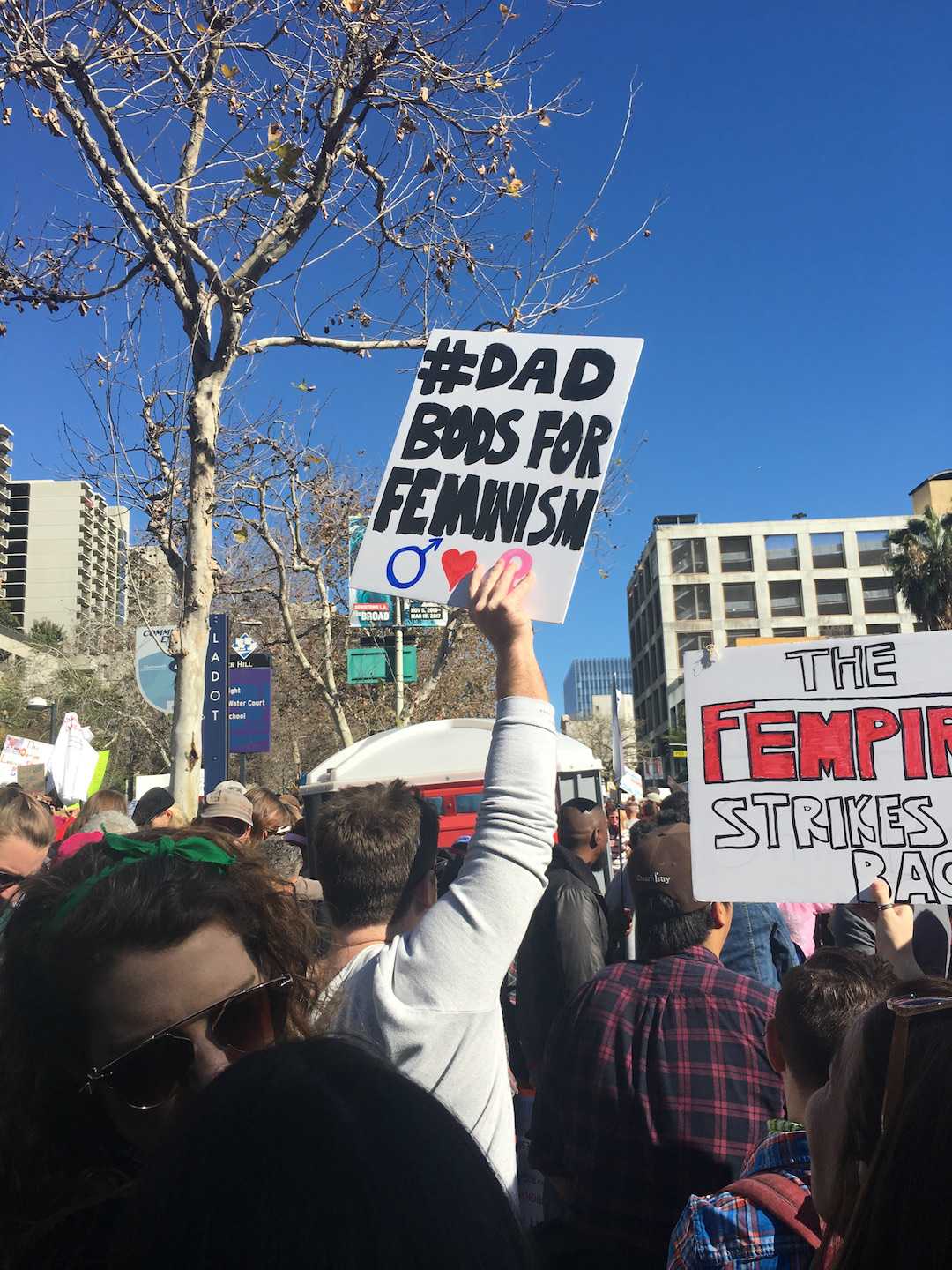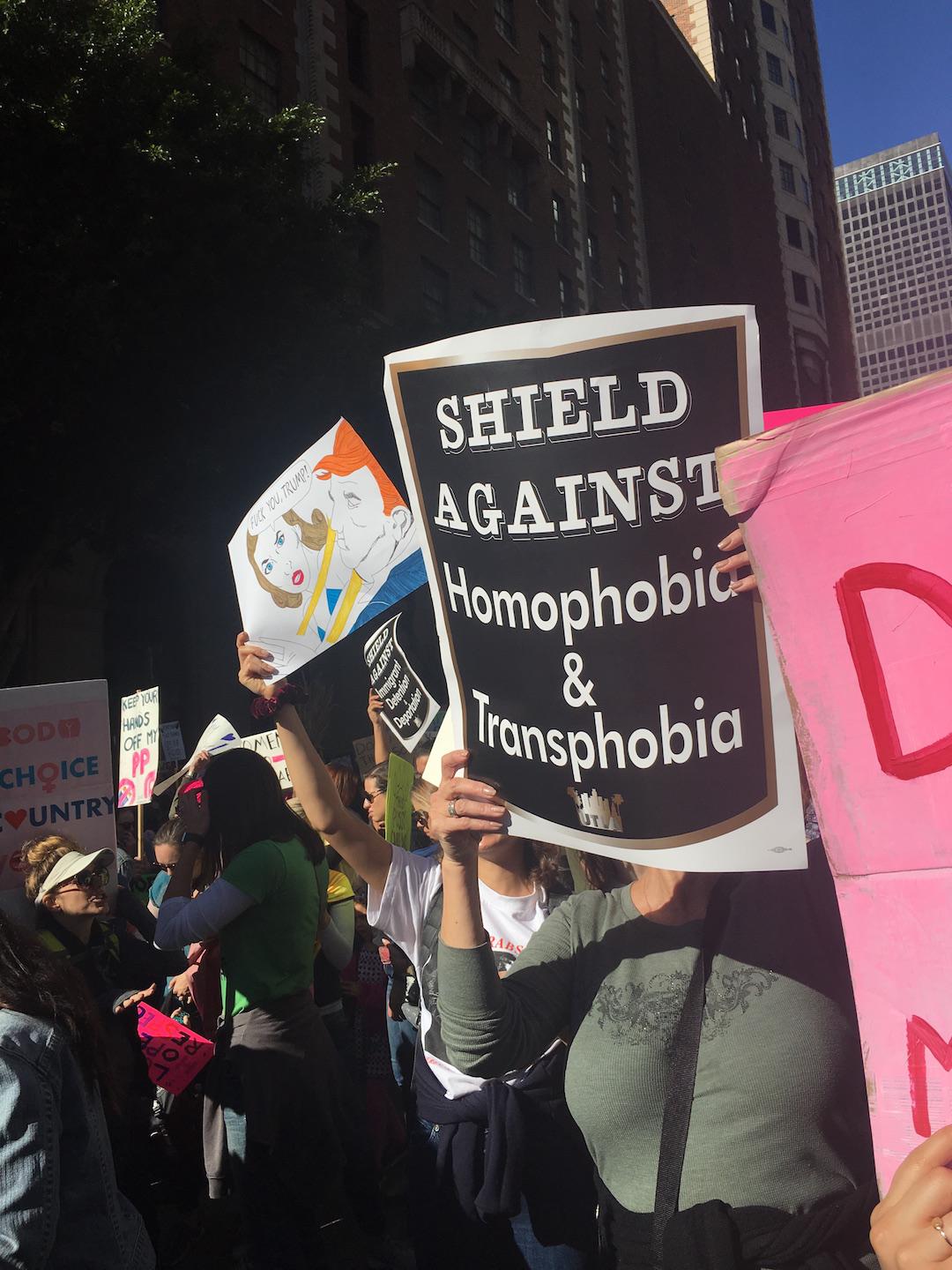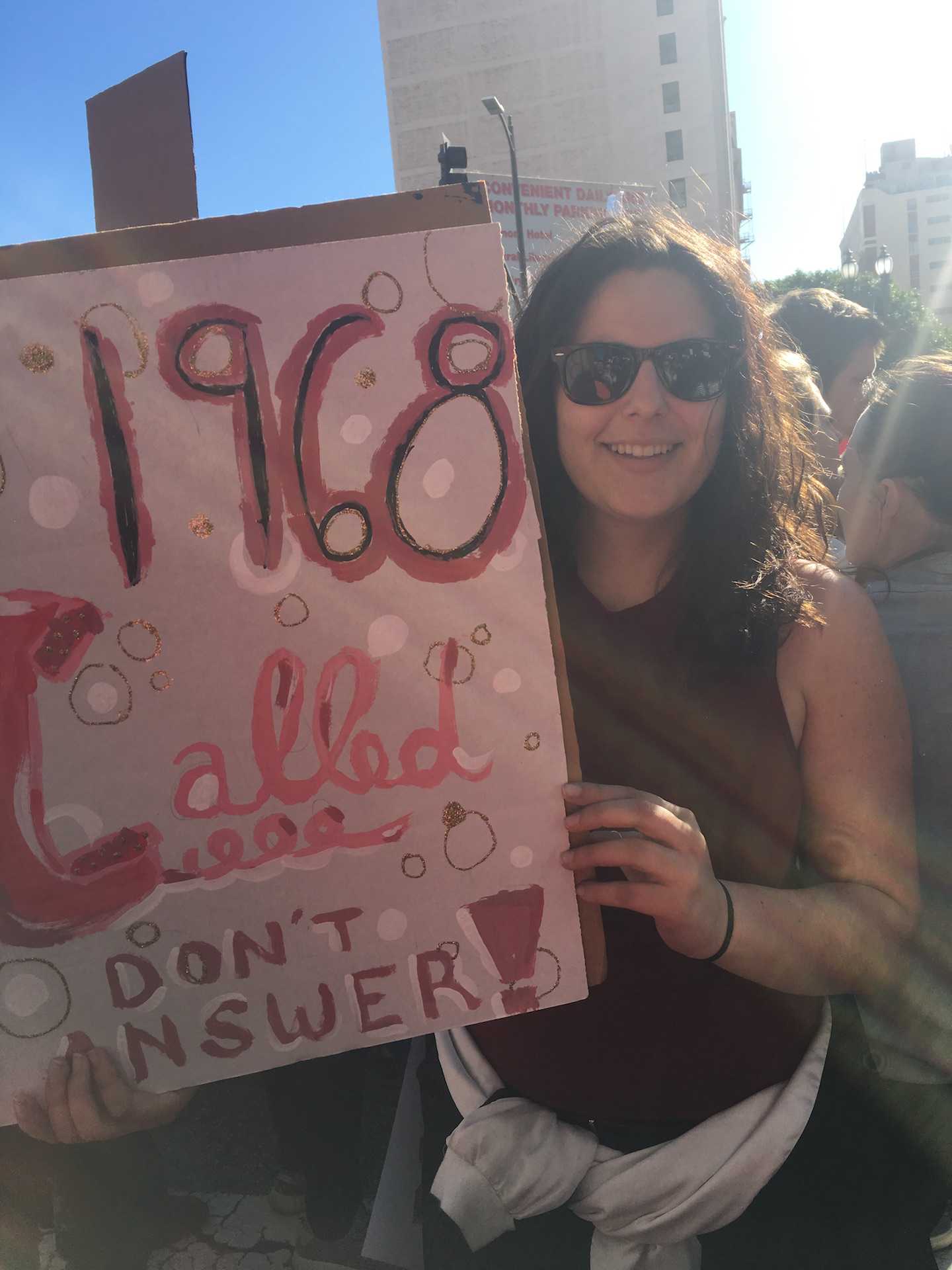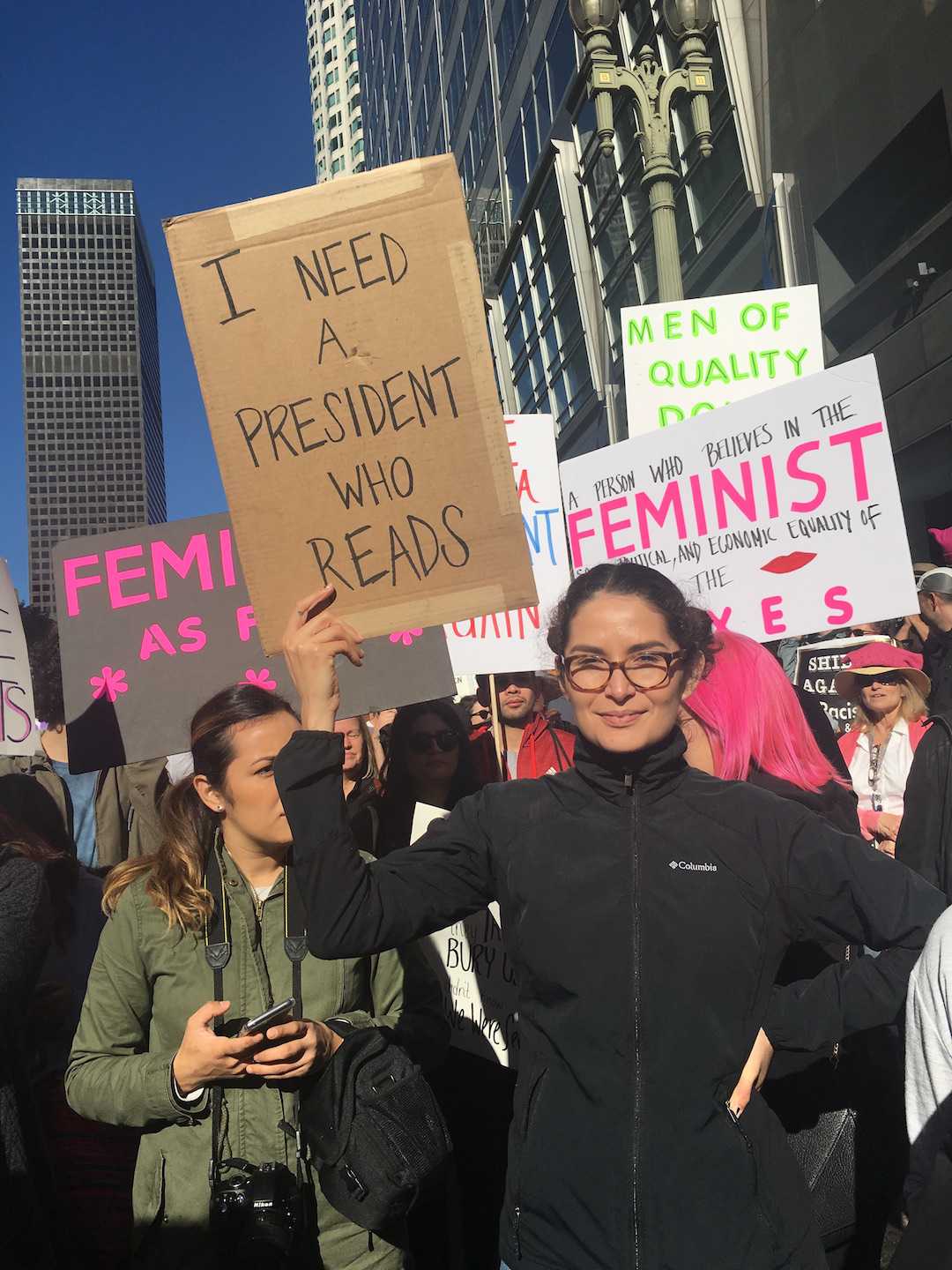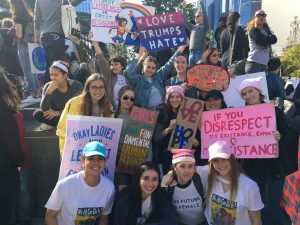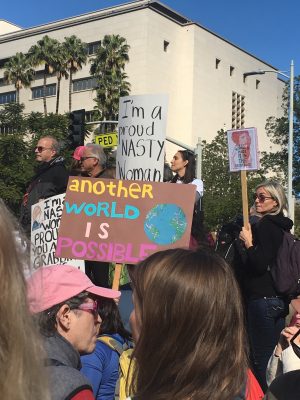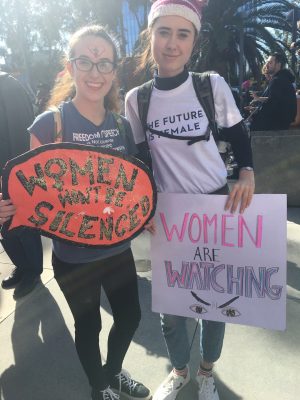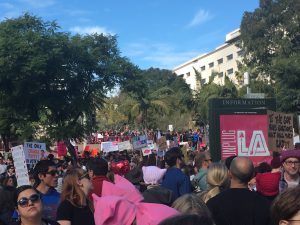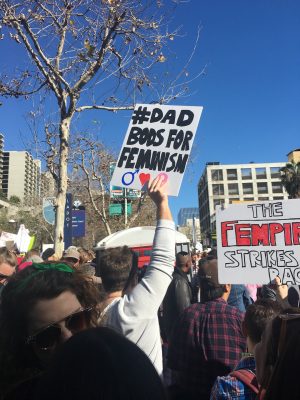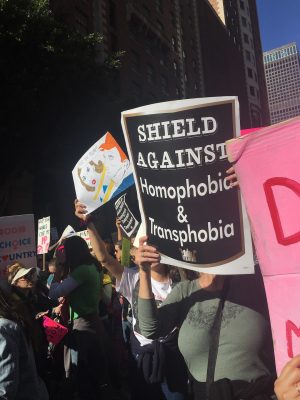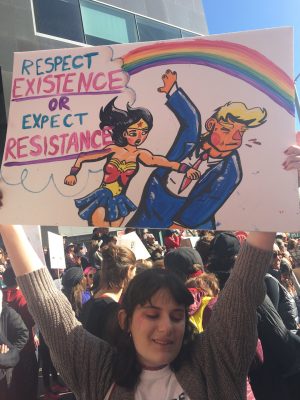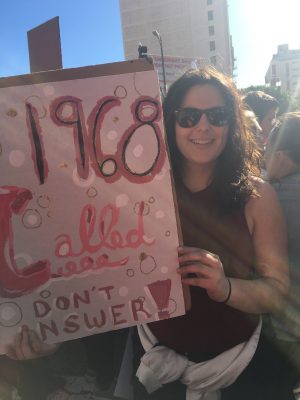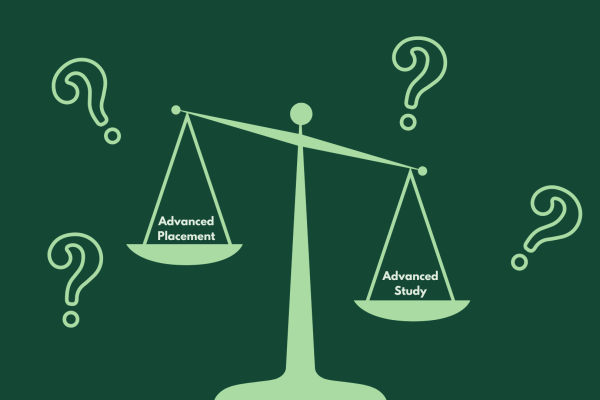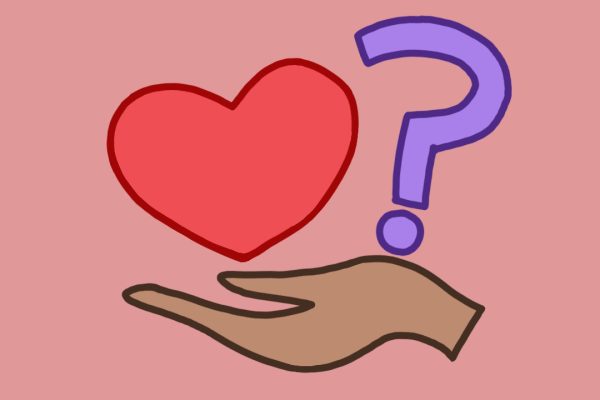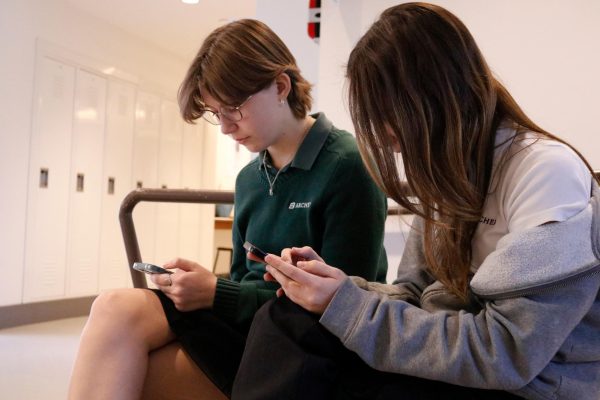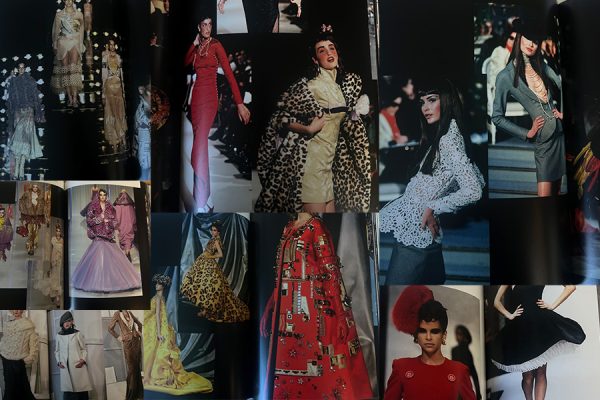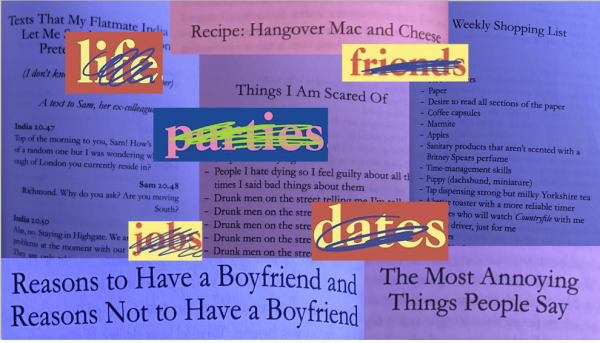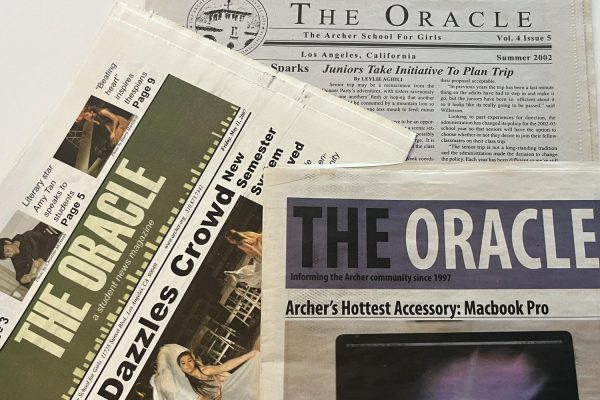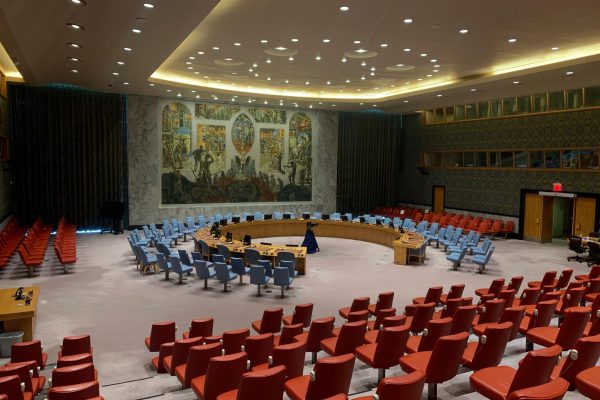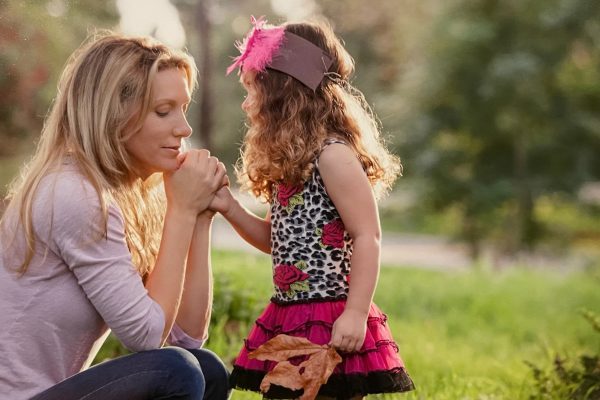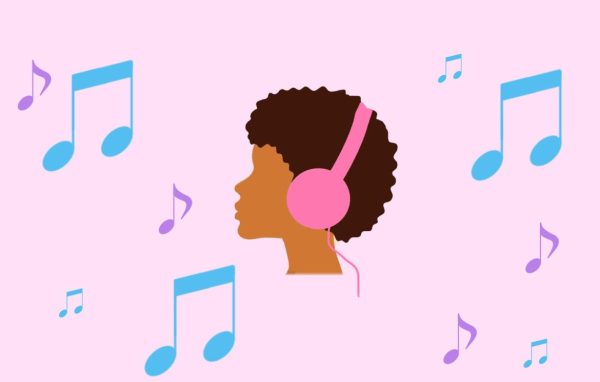The Present is Female: thoughts from the Los Angeles Women’s March
Photo credit: Eloise Rollins-Fife
Some of the hundreds of thousands of protest signs at the Los Angeles Women’s March are held high by Archer girls. Signs at the march ranged from humorous to somber and touched on a variety of social, economic and environmental justice-related issues.
On Jan. 21, I marched in the largest protest United States history. This is my story.
Thought One: It’s too freaking early for this.
After a long week of waking up at 6 a.m. for school, I’m not exactly jumping for joy at the thought of giving up my Saturday morning to do the same. I had been so excited to go and be a part of such a special, historic demonstration — until I actually have to leave the comfort of my warm, inviting bed, scarf down a bagel with peanut butter (for protein!) and join the masses at the downtown Santa Monica metro station. The crisp, sunny weather lifts my spirits eventually, though, and after ditching my mom for a few friends, I hop onto a train car filled with people sporting p—-hats, resolve renewed.
Thought Two: How many people can they fit onto one train?
Surely this must be some sort of fire hazard. Bodies are packed tightly into the confined space as we chug along, and my stomach starts to churn. I’m filled with the sudden urge to flee, the nausea suddenly as overwhelming as the crowd I’ll soon be joining. We’re the first stop on the route, and there’s already no room for any new passengers; every time we come to a halt we have to reject the waiting crowd.
There’s an air of joyful purpose on the train, and people chat excitedly, but everything’s a little too manic for my taste. There’s an underlying feeling here: we shouldn’t have to march for this. Something is very, very wrong in our country and no one knows quite what to do about it. Today’s march is a desperate attempt to start somewhere, to scream a little bit louder than the hate echoing on our screens and in our heads and in our white house since our new president took office. No, wait, not our president, the president, if the chants are to be believed.
Thought Three: Is this dude man-spreading on his way to a women’s march the pinnacle of irony?
Man-spreading, for those unaware, is when a male passenger utilizes public transportation and spreads himself out across seats, forcing smaller (read: female) passengers to shrink in theirs. Somehow the man next to me has accomplished this without sitting down, effectively taking on the position of a starfish and leaving little room for me and my other young, female friend to breathe. Dear God, I hope this isn’t a metaphor.
I notice lots of men here, and I’m filled with admiration for my feminist allies and also just a little bit of dread. Later, the Washington Post will publish a piece entitled, “At the Women’s March, it’s the men who mattered most” (and then change the headline to, “the men mattered, too”) and I’ll try to explain why I’m upset and fail.
For now, though, I just keep dodging this guy’s armpit.
Thought Four: Oh, OK, this is gonna be big.
The crowd is literally breathtaking and we haven’t even left the train station yet. We fight our way through the streets, passing hundreds of like-minded protesters on our way, and we’re still far from the real horde a few blocks away. Eventually, we’re able to meet up with a group of Archer girls and their parents. Everyone is wearing their flashiest feminist apparel, holding signs that refuse to apologize for femaleness. By now, my nausea has dissipated and the anticipatory glee is back in full force. I’m surrounded by beautiful feminists, for goodness sake: how could this not be amazing?
Thought Five: This is amazing.
We actually haven’t started marching; we’re just walking towards the Pershing Square gathering spot, and already the energy around us is palpable. I can tell that we’re a part of something special, and no one has to explain why or how.
This is the thought that lingers the longest — as I march and scream, declarations of “my body, my choice” and “not my president” flying from my mouth, I can’t stop marveling at how lucky I am to be here, now, swimming through a sea of people in the middle of downtown Los Angeles where yesterday only cars zipped by. This is amazing. I am amazing. We are amazing.
Thought Six: I’m a fraud.
A great antidote for a political activism high? A nice heaping dose of white liberal guilt. The Women’s March is diverse, yes, but is it diverse enough? I have so much privilege — why am I complaining about my reproductive organs when black lives aren’t recognized as meaningful by much of America? All of a sudden, I’m hopelessly embarrassed by the cutesy signs surrounding me and I realize I’m fraud.
I’m not saying this realization is true or not, I’m just saying it’s how I felt. A real activist wouldn’t be bothered by how early she has to wake up, a real progressive would do more to advocate for racial minorities, a real feminist would dedicate her life to these causes rather than just her Saturday afternoon. My head is pounding with these words of self-doubt; I want to go back in time and fix all the centuries of damage that has been done to our country to escape these feelings.
Right now I’m here, however, and here means something too.
Here is where 750,000 allies stand together in the name of justice with 2 million more joining them around the world.
Here is where my sign, glittering however childishly, proclaims “Women won’t be silenced,” and so I cannot be silent.
Here is where the present is female, as one poster reads because the future is too little, too late and we are ready now.
Here is a starting point; it’s not the end goal but it is a little victory, a little declaration of independence from an administration that would love to see us fail.
The fight doesn’t end here, but it does begin, and for now, that’s OK.
Thought Seven: What’s next?
Eventually, it’s time to get out of the sun, get some food and figure out how in the heck I’m going to get out of downtown LA when thousands of others are attempting to accomplish the same feat. The event is over, but my fire has not yet faded.
The Women’s March was a formative experience; it was empowering and humbling and a beautiful reaffirmation of my progressive values as well as a challenge to my dedication. It’s a starting point, though, I remind myself. There’s work to be done.
I will attend all the protests and rallies I possibly can. Trump and his crew are counting on my eventual complacency; I won’t give them that satisfaction. There are four long years ahead, and another election in less than two. You can bet I’ll be rocking that vote. There are representatives to call, letters to mail and organizations to fund. The time to rise up is now.
The present is female— let’s prove it.

Eloise Rollins-Fife joined the Oracle staff in 2015 and was promoted to co-Voices editor in 2016. She became the Managing/News & Features Editor for...





![Freshman Milan Earl and sophomore Lucy Kaplan sit with their grandparents at Archer’s annual Grandparents and Special Friends Day Friday, March 15. The event took place over three 75-minute sessions. “[I hope my grandparents] gain an understanding about what I do, Kaplan said, because I know they ask a lot of questions and can sort of see what I do in school and what the experience is like to be here.](https://archeroracle.org/wp-content/uploads/2024/03/grandparents-day-option-2-1200x800.jpg)



















